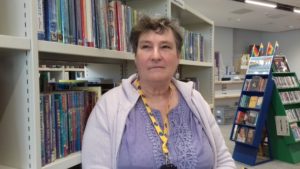Reflection on 47 years in Librarianship: from Gerbil to HGIOSL
Category: Blog, Branches and Groups, SLG Scotland
Moray School Librarian Angela Walker looks back over a library career spanning almost five decades.
Librarian Angela Walker looks back over a library career spanning almost five decades.
I have always loved reading. I lived abroad as a child, and I was always sent books for Christmas and birthdays as they didn’t attract customs duties. After school I applied to the Library studies degree course at Loughborough University of Technology. Since then I have worked constantly in some sort of library.
Public & Special Libraries
Issuing books has changed dramatically over the years. Marsh Farm Library within Luton Borough Council – where I worked for a year – was one of the very first purpose-built computerised libraries (1974). I also worked at Sundon Park Library, which used the Browne issue system. For those who don’t know, this involved little cardboard pockets with a person’s name on it. The card for the book they borrowed was popped inside, and then it was put in due date order in a long wooden tray. The catalogues were large sets of drawers with cards on a pole down the middle. One needed to be constantly filing to keep on top of it.
In my first qualified job as Children’s Librarian in Harpenden Public Library we used a photocharging system in the main branch which took photos of the front page of the book with the library user’s card. This was very quick for issue but extremely laborious for returns. The branches and the mobile still used the Browne issue system. I also worked a summer in The Chartered Insurance Institute Library where they were in the throes of transferring their stock to a computerised system. I soon realised that Special Libraries were not for me.
Luton School Libraries
I moved onto Stopsley High School in Luton where I job-shared for a year with a partner I only met in my last week. All our communication was via a message book. This was all pre-email; in fact, it was pre-computers! Now I was back to the Browne issue system and a proper introduction to the world of education: the acronyms – HODs (Head of Departments), NQTs (Newly Qualified Teachers) and the dreaded Gerbil (The Green Education Reform Bill) – class sets, timetables and the Head of Years to whom I had to appeal for help with lost/damaged/overdue books. I had to find out where I could spend my pitiful budget and I had to work out how to build both a love of reading and relationships with staff and pupils, all with no training or support.
I moved to Lealands High School as a temporary measure and ended up staying for 14 years part time with a brilliant job share or two. Again we were on the Browne issue system with a good sized library to start with and a very supportive English department. The Senior Leadership Team (SLT) at the time were not very supportive, reducing our budget, reducing the size of our library and removing our office without consultation and very little notice. Our one consolation was being bought three of the new BBC Acorn computers for pupils to use. We had a second phone line installed so we could access Prestel (a forerunner of the internet) and provide staff with up-to-date information. And then joy – computerised library management systems for schools came along, making issuing, returning and overdues so much easier.
We soldiered on computerising the library stock with me trying to fit all the qualified parts of the job into my three days of the week: inductions, book talks, class visits, etc. The headmaster only ever seemed to come into the Library to see me whilst I was scanning the newspapers to cut out articles for departments – this was well before the Independence Press and Complete Issues and the internet came along. I don’t miss all that cutting out!
Moray School Libraries
We moved to Moray when my husband was made redundant and I soon landed up working in a school library again, a part-time post at Lossiemouth High School that became full-time. I now grappled with Standard Grades and Highers, Principal Teachers instead of Heads of Departments, S1 – S6 instead of Years 8 – 13 and was introduced to How Good is Our School and How Good is Our School Library. Having gone through the contortions of the National Curriculum in England, I now went through the same with Curriculum for Excellence and the introduction of Nat 5s.
Many of the issues were the same as south of the border: building up relationships with staff and pupils, eking out a meagre budget, developing book talks, and setting up book, games and (with the advent of DVDs) film clubs. I ran research projects culminating in class presentations, organised library inductions, took part in assemblies, got involved in career talks, and delivered dictionary skills (for Modern Languages), study skills and paired reading.
Moray Council had to make cuts and decided that there was no need for a full time librarian in each of its eight schools, despite the fact that four of the librarians were award winners of one sort or another. As I was only three years off retirement I chose to opt for two small schools and have a day off every week.
I found the last three years the most challenging because the workload has more than doubled in half the time. There are two sets of staff and pupils to get to know –really difficult when you don’t see them as frequently – and two sets of overdues to chase, if they’ve been signed out properly. It takes longer to get through inductions, which means it’s now pared to the bone so you can see all the classes in a decent time frame. Book talks still happen but not as frequently. Activities like Harry Potter Day, National Poetry Day and World Book Day sometimes have to happen the day before or the day after as you aren’t in school on the right day. I have seen attendance at these activities dropping off as your visibility in school drops. And now the pandemic has meant an immersion in all things digital as we tried to cater for our staff and pupils during lockdown.
Support
Thankfully the office staff in all my schools have been so helpful, as well as the janitors. As school librarianship is such an isolated job it has been great to meet up with colleagues. In Luton the school librarians met in each other’s libraries once a term and twice a year we would have a gigantic meet up with our colleagues in Bedfordshire. That scenario has been replicated in Scotland. The Moray librarians met regularly in each other’s schools and we have arranged in-service events with our colleagues in the Grampian region. During the pandemic the Moray librarians met far more regularly via Glow and supported each other on the steep learning curve of digital provision for our staff and pupils. My colleagues both in Luton and Moray have been magnificent.
End of an era
Luton as a unitary authority had eight secondary schools; Moray also has eight secondary schools, covering a considerably larger area. In Luton I started properly in an SHS (Stopsley High School) changing to an LHS (Lealands HS); in Moray I started properly in an LHS (Lossiemouth HS) and picked up an SHS (Speyside HS) to retire in – things have come full circle.
For pictures of old style catalogues and Browne issue systems see:
https://lbhflibraries.wordpress.com/2015/07/14/from-then-till-now/
https://wcclibraries.wordpress.com/2017/03/29/forty-years-of-change/
~~~~~~~~~~~~~~~~~~~~~~~~~~~~~~~~~~~~~~~~~~~~~~~~~~~~~~~
Thank you Angela for sharing such fascinating insights into a working life dedicated to libraries and the profound positive difference they make to both the young and young-at-heart. For more brilliant blogs by SLG Scotland, please click here.
